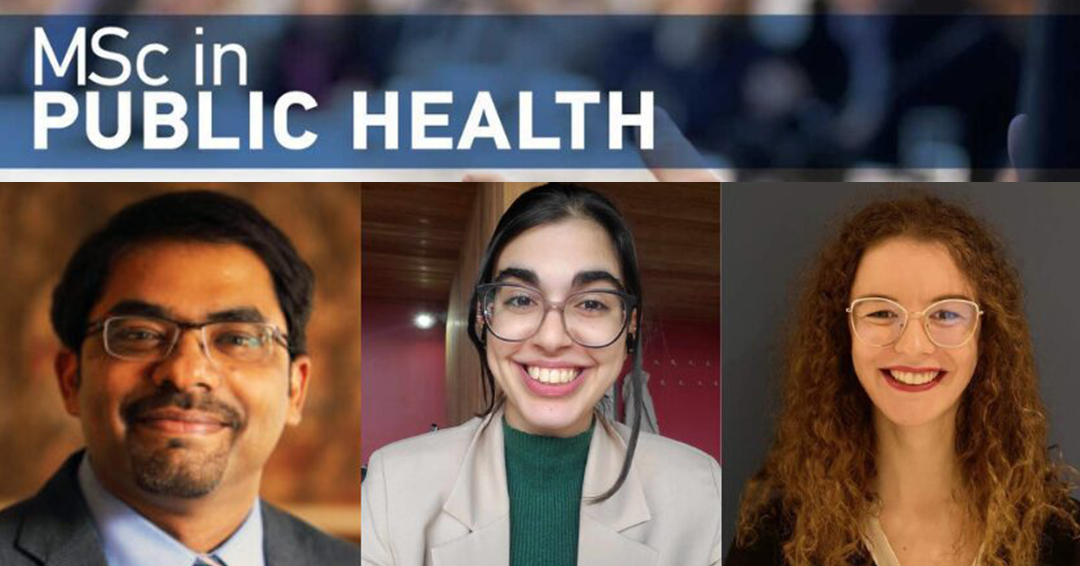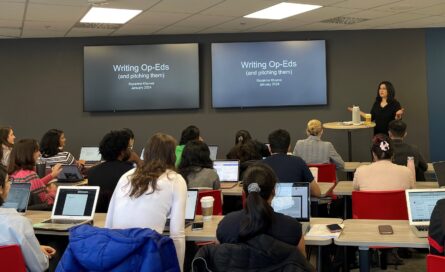
Topics include COVID boosters, fighting Islamophobia, Montreal metro safety and more
You probably wouldn’t be surprised to learn that students enrolled in the Master of Science in Public Health are studying infectious diseases, epidemiology, and health care systems around the world. However, you may be surprised to learn they’re also writing press releases, prepping for podcasts, and training for TV interviews.
Those assignments are on the syllabus for course PPHS 614: Knowledge Translation and Public Health Leadership. It’s taught by Dr. Madhukar Pai, chair of the Department of Global and Public Health at the School of Population and Global Health.
“The [COVID-19] pandemic taught me that it is critical for public health professionals to engage with the public,” says Pai. “I wanted to make sure our students know how to write, advocate, and engage with the public, media and policy makers.”
Judging by the results, his students are succeeding. In the past few weeks, they’ve published six op-eds – in The Montreal Gazette, La Presse, and more – while several others are in the works.
“The students are excited,” says Pai, “and it’s what I think public health students should be doing.”
Hot off the press

The first op-ed appeared in The Montreal Gazette on February 21. Co-authored by Gabrielle Gosselin, Meghan Pritchard, Mariane Saroufim, and Charlotte Serrano, it encouraged readers to get COVID-19 boosters.
“It was an opportunity to choose a topic that mattered to you, and I thought, ‘yes, this matters to me’,” says Saroufim. “No one in my family is vaccinated, so I pushed our team to write about it.”
Pai invited as a guest speaker Roxanne Khamsi, an award-winning science journalist, to do a three-hour workshop on op-ed writing. She walked the class through what an effective op-ed looks like: writing a catchy title, choosing a hook, and deciding who to pitch to and when.
Serrano appreciated all the feedback she got from Pai, Khamsi, and The Gazette, and admits that seeing the final version in print was very exciting. “It really motivated me to advocate for the subjects I’m passionate about,” says Serrano.
Saroufim says the online article garnered both positive and negative comments. “We see it as a sign of success. It means people are reading and thinking about it,” says Saroufim, who translated the piece into French and Arabic as well, to garner an even larger audience.
More to come
Next up, Pai’s students will be drafting persuasive speeches, running advocacy campaigns, and confronting misinformation. They’ll also keep pitching op-eds. He anticipates 10 could be published before the semester ends.
“Strong scientists should take the microphone so we can be the first ones to provide good information,” says Pai. “Even the best science may not get translated into action on its own. You have to go out and make it happen.”
As the 2018 winner of the President’s Prize for Public Engagement through Media, Pai is well placed to give to give advice, even to those outside his class.
“Start small: write letters to the editor, op-eds, blog posts, or get active on social media,” he says.
Are you a McGill faculty or researchers looking for guidance? Contact the Media Relations Office for tips on writing op-eds as well as media training.
Op-eds published by Master of Science in Public Health students:
- COVID is still with us, so go get vaccinated, The Montreal Gazette
- The trouble with the STM’s new ‘safety ambassadors’, The Montreal Gazette
- How an app can help fight Islamophobia, The Montreal Gazette
- Eating disorders don’t discriminate in terms of gender, Speaking of Medicine and Health
- Florida’s ‘quick fix’: Instead of looking to Canada for cheaper drugs, U.S. should regulate its own prices, Healthy Debate
- Pourquoi la Société canadienne de la COVID est-elle lancée?, La Presse
